Bezos Earth Fund’s Andy Jarvis: ‘There Was Too Much Hopium on the Alternative Protein Menu’
Andy Jarvis, director of the Bezos Earth Fund’s Future of Food programme, talks alternative protein, Asian centre, government bans, VC investments, and stepping away from the us-versus-them mentality.
Since announcing the $1B Future of Food fund at COP28, the Bezos Earth Fund has been in a hurry. It began with a $57M commitment in grants that will help tackle climate change, biodiversity loss and food security, followed by a $100M investment earmarked for three alternative protein centres.
In less than 30 days, it has already opened two of these Centers for Sustainable Protein – one at North Carolina State University, and another at Imperial College London (each received a cash injection of $30M). A third one is set to open in southeast Asia, as reported by Green Queen, in just a few weeks.
The rapid pace of investment has been intentional. Bezos Earth Fund has cited the world’s growing population – a projected 10 billion by 2050 – as an immediate challenge to the food system. Taking action now is critical. “Later is dangerously too late,” as Andy Jarvis, director of the fund’s food programme, has put it.
So, as the Earth Fund continues to pump in tens of millions towards a more resilient food system, Jarvis speaks to Green Queen in a wide-ranging interview to discuss how the team chooses which universities to partner with, alternative protein’s biggest problems, the role of governments in the protein transition, and the involvement of the fund’s founder, Jeff Bezos, and vice-chair Lauren Sánchez.
This interview has been edited for clarity and concision.
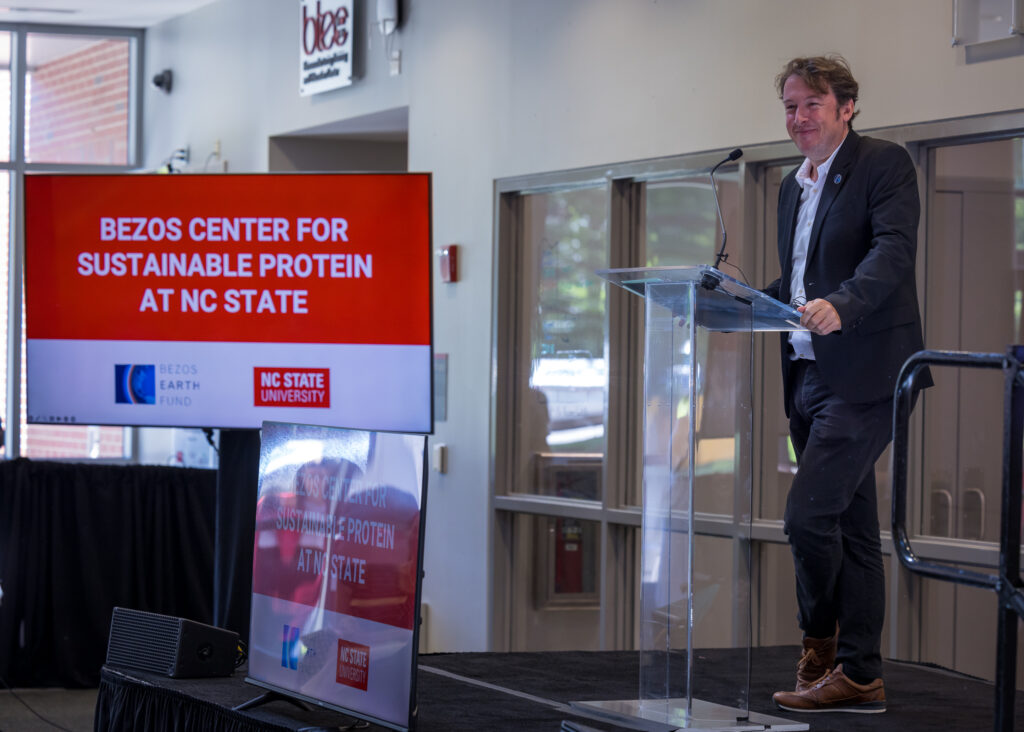
Green Queen: How did you choose the specific universities in the US and the UK? Was there a tender process?
Andy Jarvis: We worked with the Good Food Institute. We started out with dozens of universities on a long list, and we applied a few criteria and landed on 14, from whom we invited proposals. And then we had a pretty rigorous evaluation committee that went through all of those proposals on set criteria that we’d agreed on and gave us recommendations.
Based on those recommendations, we’ve been deploying these grants. So far, the ones that have been announced [are] North Carolina… in the US, Imperial in Europe, and we’ll have a third one in southeast Asia.
GQ: Will the centres be collaborating with each other? How would that work?
AJ: Each of them is designed to stand up on their own in the first place, but at the same time, we are looking to integrate these three [centres]. So, they’re getting to know each other – they didn’t develop these proposals together, but right now… we’re having monthly integration calls, where we’ve put in their hard-wired collaborative efforts that are going to make sure that those centres are talking to each other and responding to emerging opportunities in an integrated way.
The centres will work as both individual centres in their domain in their geography… but at the same time, they’ll be responding to global issues and working together. So if in Europe, we have X demand for something, and we have that capacity in the US, then we’ll link that up as well. So yeah, the idea is that they are going to be very much working as a cluster.
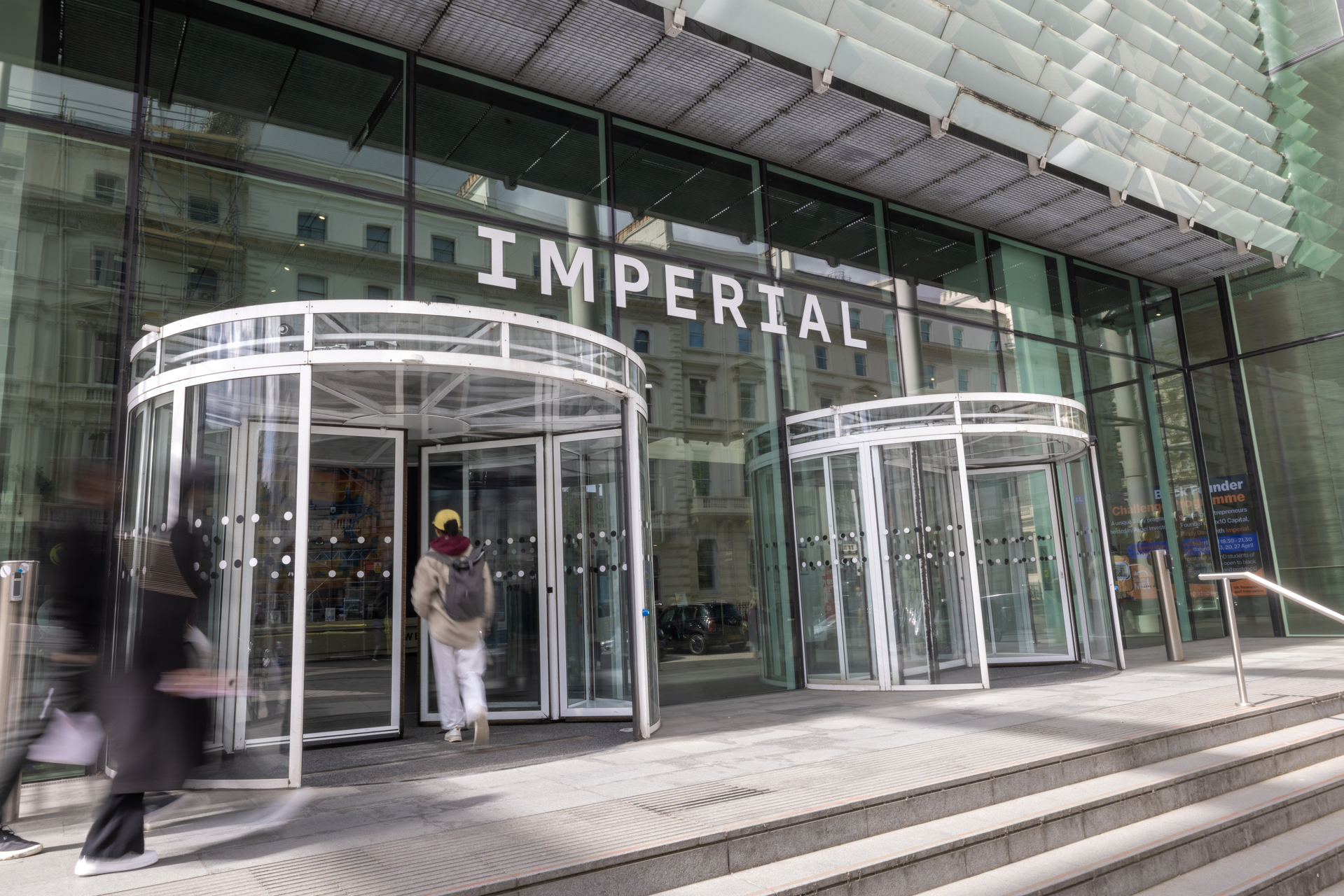
GQ: Are they going to be working with startups too?
AJ: Actually, this is a note for the third centre – we didn’t make as much of a point of this, but for example, in Imperial, there’s $30M from us, but there’s an additional $20M of co-funding coming in from both the university itself, but also from a diverse array of partners and companies around the university.
Everything from 20 to 40 startups, companies, other universities, research institutions, NGOs [are] in the sphere of the centres. Each centre has that quite diverse ecosystem of collaborators.
GQ: What is the ultimate goal? Do you want to create ingredients for manufacturers, and products for the end consumer, or is it primarily a research focus?
AJ: The companies and startups, they’re the ones that develop products, and do all of that heavy lifting. What we want to do is a combination of two things…
[The first is to] move the pre-competitive line up. What we’ve identified is so many startups are doing duplicative research, they’re doing the same thing with very precious R&D money. You’ll have 20 of these companies doing the same thing. It’s not gonna give them a competitive edge, but it’s a cost. So we want to move the pre-competitive line up with good open-access research that is going to solve some of those basic problems.
The second is looking at the breakthrough science: what are going to be some of the breakthroughs that will drive our ultimate goal, which is to reduce the price, boost the taste and texture… and improve the health and nutritional benefits. The idea is that this will be managed in a way that’s going to maximise societal benefit. So we default to open-access, so that any company then can license that IP and use it.
That’s the process of what the research will be doing. It needs to be responding to the demand coming from the sector, the sector should be saying: “These are our problems, this is what’s driving costs too high, or this is where we’re struggling with taste or texture,” and the universities go after those problems.
The ultimate aim for us is to reduce price, boost deliciousness, and improve the health benefits. The way we see this, if you do that, you’re driving their market share. So what we’re looking for is that this takes 10-20% of global market share over the next decade or so. And if you have 10% or 20% market share, you’re having planetary-level impacts.
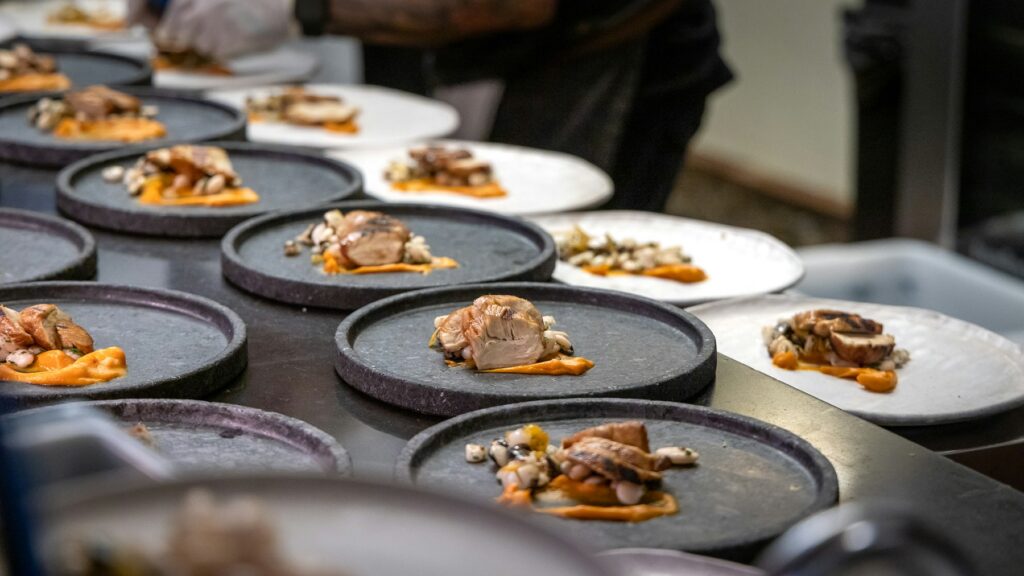
GQ: You’ve talked about hitting the taste, nutrition and price touchpoints – which do you think is the most important, and why?
AJ: I think [Leon co-founder and government advisor] Henry Dimbleby put it perfectly. He said as a professional restauranteur, it’s very hard to convince someone to purchase something that is more expensive and tastes worse. That’s a very hard value proposition for a consumer.
So the way we see it is, you have to hit all of these things. And obviously, we’re interested in the sustainability angle of this, but you’ll have no sustainability impact, unless the price and the taste are on parity – that’s an absolute necessity. Otherwise, it’s just more products for vegetarians and vegans. What we need is something that is going to be attractive as a value proposition to carnivores. For that, it needs to cost the same or less, then it needs to taste just as good or better. That’s the bottom line.
GQ: Impossible Foods CEO Peter McGuinness has talked about how plant-based was launched incorrectly, and that the climate argument no longer resonates with consumers. Do you think there’s still room for companies to lead with the climate?

AJ: Climate is an impact that you will have, but it’s not the primary one. And it’s certainly not the one that is going to sell a product – people won’t buy based on sustainability. All of the poll data globally shows the first concern is price… and up there equally is deliciousness. Third is health and nutrition, and perceived impacts on that… and somewhere along the long tail of other things is sustainability.
Yes, there’s a portion of the population that is interested in that and it’s smaller – the vast majority of people are not looking at that. And so, you nail the first three, right? That’s what we’re trying to do.
GQ: Can you talk more about how you are allocating the $100M commitment? Any particular organisations you are supporting?
AJ: The $100M is our current commitment we have, and we’re staying true to that and delivering it. The two announcements so far, take us to $60M of that, and you can do the maths, there’s another one coming. And there’s another [ancillary] grant we haven’t announced yet, but basically, over the next three months, you’ll see the whole $100M committed. It’s all focused on these Centers for Sustainable Protein.
GQ: Bezos Earth Fund has heavily invested in alternative proteins at a time when VCs have largely deserted the sector. Why do you think funding has declined, and what has made you keep faith?
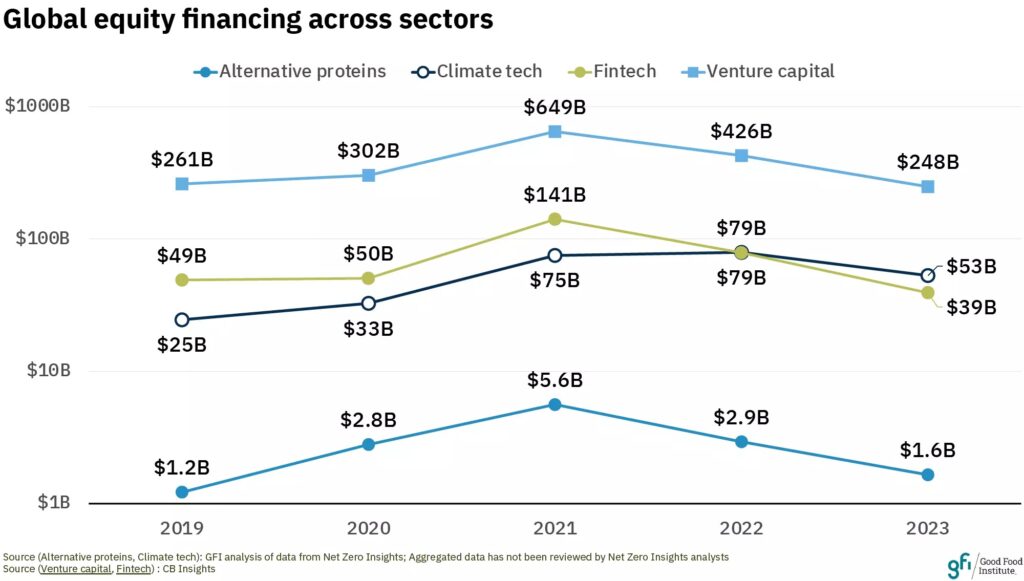
AJ: I think it was a boom and bust cycle. The expectations on the sector were just way too high. And it was too much, too fast, the venture capital that flowed into the sector. Time will tell how good it was for the sector, but I think the expectations that were provided for that – that we’re going to have products on the shelves that these serial carnivores will be buying in the next five years – haven’t checked out.
There was a little bit too much ‘hopium’ on the menu there. This is early in the journey, right? I always just bring it down to the ground – in all time, $16B has flowed into the sector. It sounds like a big number. But it’s a tiny number. For example, if you look at agricultural subsidies around the world, it’s $700B. $200B goes into animal agriculture subsidies. That’s every year – and $16B of investment into alternative proteins is just a tiny amount. Really.
So yes, venture capital went in probably with unreal expectations in terms of time and profit, and right now, it’s pulling out because the promises weren’t kept, the companies haven’t delivered, and consumers haven’t been buying.
We see that as a flash in the pan, though… What we’ve identified is that venture capital helped create a lot of buzz and progress on certain things, but the sector skipped the beat and didn’t invest in foundational R&D and knowledge, which is going to be a much stronger base upon which to build a real industry.
That’s why we’ve gone back to basics a little bit. Let’s get that open-access R&D in place. And if you look at any major innovation around the world – look at the curves of solar panels and investment and penetration. They go through these big growth periods, and then they go through consolidation. We’re just in a consolidation [period for alternative proteins]. We’re in this for the long term, to make this succeed over the next two decades. It’s a tough time for the sector. But it’ll pull through.
GQ: Since you brought up subsidies, I want to talk a little about alternative protein policy. Upside Foods just held a tasting in Miami before Florida banned it. What’s your view on these bans, and how do you think they hurt the industry? Do you think more of these are going to happen, or it’s going to flatline after the election?

AJ: Predicting politics is a dangerous game. But first of all, this is an innovation area of enormous potential and new economic opportunity, and [this] should have open innovation. The second instance, though, is that this topic has become very polarised in debates about cultivated meat.
I put some of the blame in the hyperbole that was created during the pandemic, that this is going to displace livestock, this is going to end industrial farming, and you won’t have any cows on the planet in 10 years’ time – you know, that kind of talk has been very dangerous and damaging for the sector, and it’s exactly what we should not be saying.
We’re heading towards 10 billion people, we have 50% growth in demand, and if you can complement animal-sourced foods with a double-digit percentage of the market with alternative proteins, you’re having enormous impacts. So we shouldn’t be talking about displacing.
And all of this policy response that’s coming, for example, in Florida, is protectionism. It’s a measure to protect what they perceive as a threat to farming. And it’s a non-threat, it just shouldn’t be seen as that… What we need is for farmers to be producing sustainably. We invest also in livestock – there are enormous opportunities to reduce emissions to produce animals in a high-welfare state, and to be sustainable. That should be supported and encouraged, and we should be looking at alternatives.
If you depolarise this conversation, then there’s no need for these kinds of legislative actions. That’s the way we see it: you need open innovation, and you need to recognise that 10 billion people is a huge market, and there’s space for multiple options in delivering that.

GQ: How do you depolarise when these legislations and proposals are built on misinformation and unawareness? And is that going to be part of your research focus?
AJ: We’re not investing in dealing with misinformation. We’re investing in building evidence and science and delivering the innovation, and letting that speak for itself.
I think there’s a story to be told about how plant-based meats are all produced by farmers – that ‘plant base’ is grown by someone, and those people are farmers. Fermented products – whether it’s precision fermentation, biomass fermentation, you name it – they’re using sugars and all sorts of inputs that are farmed products.
Even cultivated [meat] – everyone gets kind of very nervous about cultivated, that it’s lab-grown thinking, that it’s completely detached from farming. Well, the [culture] media are sugars, and all sorts of minerals and things that are coming from crops, and they’re farmed goods.
So this is not an anti-farmer sector; this is a sector that is using farmed products in new ways. And generally using farmed products that are more profitable and highly sustainable in the way they’re produced – many legumes and things like that. This is not an either-or, this is not ‘farmers or non-farmed products’: these are all farmed products, and they’re just produced by different means.
That’s the narrative we need to be having – creating a bit more of a nuance, [and] stepping back from this ‘you or us’ mentality. There is an enormous demand for protein in the future. 50% growth – there is no way we can deliver that with a business-as-usual approach. So we need to think about making livestock more sustainable and the things we need to do there. And we need to be thinking about how these alternative proteins are complementary proteins that can also play their role.
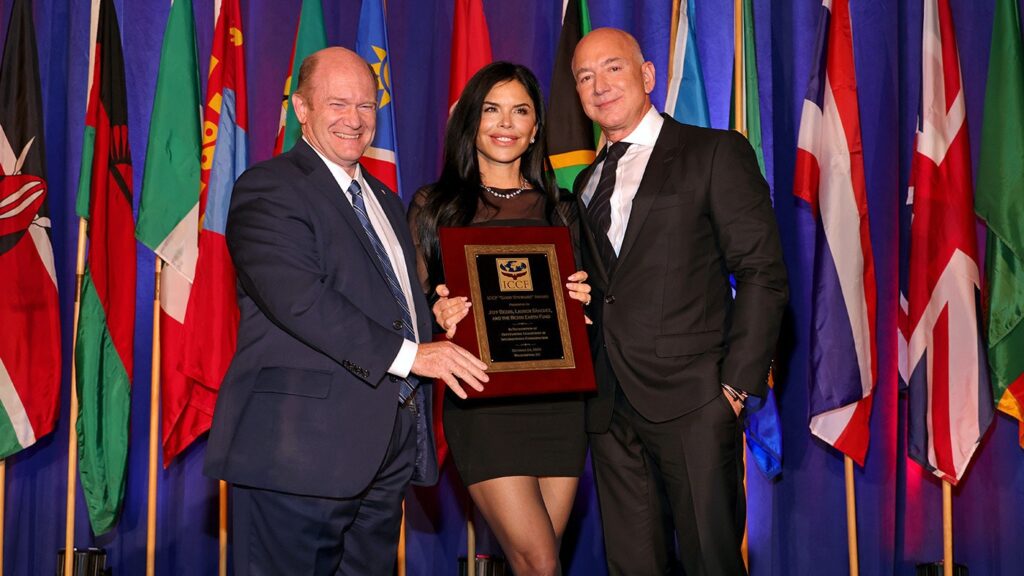
GQ: How important do you think policy is, and what can governments do to accelerate the protein transition?
AJ: Policy is obviously enormously important. The regulatory environment for many of these things is also make-or-break. That needs to be worked out.
We’ve talked about the venture capital, and that going away – what we want is for governments to step up and support the sector, and give it a chance. The level of funding coming from governments into the sector is not at all representative of the importance that [alternative proteins] have in the future.
Many governments are interested in it and would like to do things, but the polarisation makes it a political issue, and it shouldn’t be a political issue. This should be an issue about ensuring the long-term future of food security and food prices and availability of healthy, delicious, nutritious options. Governments needs to step up. They should be supporting research, and enabling the regulatory environment.
We also need the private sector to step up… For example, Lidl Netherlands’ [growth in plant-based meat sales after putting them in the meat aisle] is an example of leadership coming from the private sector, and it just shows when you do actually start levelling the playing field, the results happen. That’s our call, to level the playing field. If you’re providing enormous subsidies for animal agriculture, provide subsidies and government support to the alternative protein sector as well.
GQ: You told Green Queen that your third location will be in Southeast Asia. Can you tell us anything else about it?
AJ: The only thing that’s out there is [it’s in] southeast Asia. We’re looking at potentially saying something about it sometime end of August or early September.
And just to say about the two centres that we’ve already launched: NC State was kind of a focus on biomanufacturing, Imperial is looking at engineering biology. We’re looking for each of these centres to take on its own kind of flavour of approach and focus, and be complementary. So you can expect something complementary in the next one.
GQ: It’s called the Bezos Earth Fund. How involved is Jeff Bezos, and how involved is [Bezos’ fiancée and the fund’s vice-chair] Lauren Sanchéz?
AJ: Super engaged. You’ve seen them on stage. You can see all of these interviews that they’ve done, and speeches. Obviously, this is a new-ish area for Jeff, we’re still young and on this journey. They’re incredibly engaged in exploring this domain of work.

GQ: Finally, this is a $1B commitment. What other food system verticals are you looking at?
AJ: Our marching orders at the moment are to accelerate and focus on sustainable protein. The way we see it, you can’t fix climate without looking at food, and you can’t fix food without looking at protein.
So we’re laser-focused on sustainable protein at the moment. We may, between now and 2030, look at some other topics. And we continue to work very actively in the sector as a whole, advocating for the transformation of food systems, and the broad changes that are needed. It’s not only going to be fixed with sustainable protein, it’s going to be fixed with many different things.
We were instrumental in a lot of the work in Dubai on food at COP28, the Declaration on Sustainable Agriculture, Resilient Food Systems, and Climate Action, all these kinds of things. We see that as the global architecture of food system transformation that needs to be enabled. But then I think, you know, every foundation, every philanthropy, every organisation, every NGO needs to play a role in their domain to deliver that. And so right now, sustainable protein is where we’re putting the grants and putting our focus.



